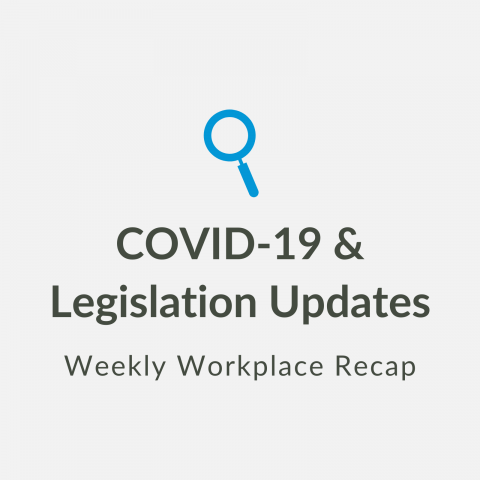COVID-19 & Legislation Updates | Workplace Recap from June 17 to June 30, 2022

Below are the key COVID-19 & legislation topics that touch on the workplace from June 17 to June 30, 2022.
Federal
Feds announce start date for 10-day paid sick leave
Federally regulated workers will have access to 10 days of paid sick leave before this year ends.
Amendments to the Canada Labour Code regarding the new benefit in the federally regulated private sector will come into force no later than Dec. 1, 2022, according to Seamus O’Regan Jr., minister of labour.
Discussions regarding paid sick leave for all workers across the country are ongoing.
Canada extends COVID-19 measures until Sept. 30
Random COVID-19 testing of fully vaccinated travellers will continue to be paused at all airports until mid-July.
The Government of Canada has also extended current COVID-19 border measures for travellers entering Canada until at least Sept. 30, including the mandatory use of the ArriveCAN app.
Ontario
Arbitrator allows exemption to vax requirement on basis of creed
The recent decision in Public Health Sudbury & Districts v Ontario Nurses’ Association appears to be the first time that an employee has succeeded in arguing an entitlement to a creed based exemption to their employer's mandatory vaccination policy.
Arbitrator Robert J. Herman outlined what an employee must establish to support a request for an exemption from COVID-19 vaccination on the basis of the Code-protected ground of creed, namely:
(i) they have a religion or creed;
(ii) there is a nexus between their refusal to get vaccinated and their religion or creed; and
(iii) they are sincere in their belief that their religion or creed prevents them from getting vaccinated.
Takeaway for Employers
This decision appears to suggest that as long as an employee holds a sincerely held belief that is connected in some way to their creed, they will be entitled to accommodation pursuant to the code. It also suggests a significant amount of deference to employees when assessing their sincerity — in this case, the many inconsistencies pointed out by the employer were still not enough to change the result. Although this decision is in the unionized context, employers will still want to take note, as it may open the doors for more successful exemption claims on the basis of creed.
Alberta
Human rights tribunal reminds employees of their accommodation duties
In Zupcic v Saputo Foods Limited, 2022 AHRC 13 (Saputo), the Human Rights Tribunal of Alberta dismissed an employee’s complaint that that she was discriminated against in employment on the ground of her physical disability in violation of section 7 of the Alberta Human Rights Act (AHRA) when the employer terminated her employment.
Takeaway for Employers
Saputo reminds employers that they are not the only party with duties in the accommodation process. While employers must make an offer of accommodation when circumstances require it, employees also have duties relating to their accommodation. Employees must actively make their employers aware of their accommodation needs based on their restrictions, supported by medical evidence, and cooperate in implementing reasonable accommodation offers.
Employees who fail to satisfy these obligations will find it difficult to succeed should they claim unlawful discrimination when their employment is terminated, as their employers will be perceived as having satisfied the duty to accommodate.
British Columbia
B.C.'s anti-racism data legislation becomes law
British Columbia’s proposed legislation to dismantle systemic racism faced by Indigenous and racialized communities across the province has received royal assent.
Bill 24 – 2022, or the Anti-Racism Data Act, authorizes the collection of personal information to identify and eliminate systemic racism, advance racial equity, and allow the government to meet better the needs of Indigenous, Black, and racialized groups in the province. The new law − the first of its kind in Canada − was co-developed with First Nation Leadership Council and Métis Nation BC.


